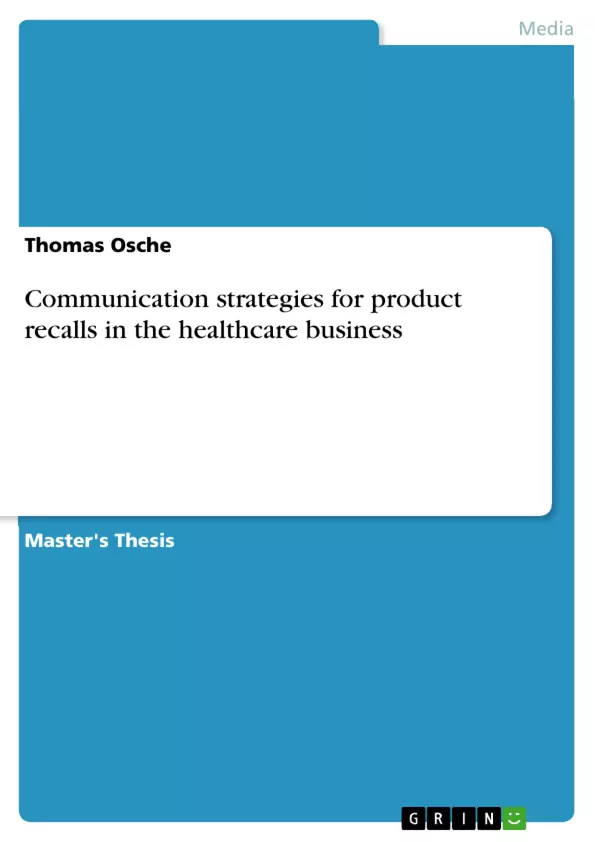After a series of cardiac implantable device recalls hit the industry in the year 2005 the question of a favourable corporate communication strategy about inevitable product recalls was raised. Knowing that it is impossible to produce 100% failure free products I was personally interested in seeing how such recalls occurred and how successful they were handled by the different companies from a communication perspective. This thesis analyses such device recalls since the year 2000 and attempts to identify a favourable communication strategy for the companies involved in such recalls in the future.
Qualitative analysis was performed on various secondary data sources to find positive and negative aspects of different communication strategies for the affected companies. Four companies could be analysed, where three provided significant results, which were used for final recommendations. Those recommendations are provided to support active corporate communi-cation. The basis of the recommended communication strategy is as follows:
Provide disclosure about probabilities of malfunctions while supportive to the most powerful stakeholders, which are the physicians and the regulatory authorities. When one company faces a recall it is favourable to take accountability and give advice to physicians about how to respond to their patients, because they are facing the problem of having all the information at hand without an adequate guideline which summarises a clinical decision on how to act and how to weight risks of keeping the existing device versus the risks of device change-out procedures.
Keywords: communication strategy, crisis management, corporate communication, healthcare business
Inhaltsverzeichnis (Table of Contents)
- Introduction
- Research purpose and research questions
- Limitations
- Structure of the thesis
- Literature review
- Attribution
- Crisis and reputation
- Legal aspects
- Learning from a crisis
- Perception
- Communication channels
- High reliability and normal accident theorists
- The business impact of bad news
- Stakeholder analysis
- Corporate communication models
- Research methodology
- Research strategy and design
- Data sources
- Analysis techniques
- Ethical implications of the research
- Findings
- Product recall analysis
- Communication response to the recalls from different stakeholders
- Stakeholder analysis
- Discussion and interpretation
- General discussion of the findings
- Communication strategies of the companies under study
- General discussion of trends
- Who drives the discussion in the healthcare community
- Methodological aspects and validity
- Conclusions and recommendations
- Research questions
- General conclusions and recommendations from the corporate perspective
- Appendix
- HRS FAQ on Policy Recommendations: Implantable Cardioverter Defibrillator and Pacemaker Performance
- Device recall list
Zielsetzung und Themenschwerpunkte (Objectives and Key Themes)
This dissertation examines communication strategies for product recalls in the healthcare business. The main objective is to understand the communication challenges companies face when recalling medical devices and how these challenges are addressed through effective communication strategies. The study analyzes a specific set of recalls from different companies in the industry and examines how stakeholders perceive and respond to these recalls. The research explores the legal, ethical, and reputational implications of product recalls, as well as the impact of these events on business operations.
- Communication strategies in product recalls
- Stakeholder analysis and perception
- Legal and ethical implications of product recalls
- Business impact of product recalls
- Communication channels and strategies for effective communication
Zusammenfassung der Kapitel (Chapter Summaries)
The dissertation begins with an introduction that outlines the research purpose, research questions, limitations, and structure of the study. Chapter 2 provides a comprehensive literature review, examining existing research on product recalls, crisis communication, and reputation management in the healthcare industry. The chapter also explores relevant theoretical frameworks, including high reliability and normal accident theory, and analyzes the business impact of bad news.
Chapter 3 describes the research methodology employed, including the research strategy and design, data sources, and analysis techniques. The chapter also addresses the ethical implications of the research. Chapter 4 presents the findings of the research, focusing on the analysis of product recalls and the communication response from different stakeholders. It includes a detailed stakeholder analysis, examining the influence and interests of various stakeholders involved in the recall process.
Chapter 5 discusses and interprets the findings, exploring the communication strategies of the companies under study, identifying general trends in communication practices, and examining the role of different stakeholders in shaping the public discourse surrounding product recalls. Chapter 6 presents the conclusions and recommendations, addressing the research questions and outlining key findings and insights gained from the study. The chapter also provides recommendations for future research and practical implications for industry stakeholders.
Schlüsselwörter (Keywords)
The main keywords and focus topics of this dissertation include product recalls, communication strategies, stakeholder analysis, healthcare industry, crisis communication, reputation management, ethical implications, business impact, and communication channels. The research examines the communication challenges companies face when recalling medical devices and explores the legal and ethical aspects of this process. It also analyzes the role of different stakeholders in shaping the public discourse surrounding these recalls and their impact on business operations.
- Arbeit zitieren
- Thomas Osche (Autor:in), 2007, Communication strategies for product recalls in the healthcare business, München, GRIN Verlag, https://www.grin.com/document/144773



